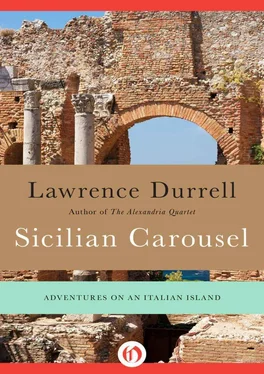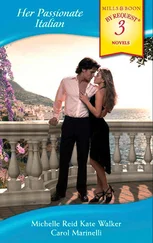It was we in the bus who felt the fear — you could see gloom and dismay on every visage as Mario drew up in a swirl of whiteness and leaned out to inform himself of the circumstances. Was there anything we could do? Nothing. An ambulance was on the way from Agrigento, also the police. The doctor with his open shirt looked more like a youthful vet. He had managed to edge his tiny Fiat right off the road into a nook while he examined the young man in the car. Nobody used the word for death either: the fact was conveyed with gestures of the fingers or the head. The whole thing was amazingly studied; it was as if all of us, even us in the bus, had been chosen by a dramatist to fill a part in this tableau. The Bishop had put on an expression which read as: I told you so. He seemed rather like the chief cashier of a great Bank (Death Inc.) who had a good deal of inside knowledge. The old Italian apple people stayed quietly smiling; perhaps they did not understand or remained locked in their dream of Eden. Renata, the German girl, closed her eyes and turned her head away. Miss Lobb looked severe, as if it reflected discredit on the tourist company to let people who had paid good money suddenly come up against this kind of thing. Beddoes straightened an imaginary tie furtively; you could see that death was for him a headmaster in Dungeness. How did I look? I caught sight of my reflection in the dusty glass and thought I looked a trifle sick — I certainly felt it; it was so unexpected on that brilliant afternoon with the sun sliding down into the mist-blue waters of the Underworld. Would we arrive before dark? We had gathered speed now, and had at last cleared the long file of lorries which were causing all the dust. The air was dry and hot; the limestone configuration of the land spoke of water and green, of spring and rivers and friendly nightingales. Deeds seemed rather remote and preoccupied by his own thoughts and I did not subject him to mine which as usual were rather incoherent and muddled — across the screens of memory old recollections of Athens and the islands came up like friendly animals to be recognized and stroked. Yes, we were in Attica, there was no doubt about it; just north of the capital, say in Psychico or perhaps east near Porto Rafti … I must not hurt Roberto’s patriotic feelings by all my Greek chatter. Sicily after all belonged to neither Greece nor to Italy now (geographical frontiers mean nothing) but strictly to itself, to its most ancient and indestructible self. On we sped, skimming the hills like a swallow.
It came in sight slowly, the famous city; at first as a series of suggestive shapes against the evening sky, then as half dissolved forms which wobbled in the heat haze to settle at last firmly into the cubist boxes of a modern city — and with at least two small skyscrapers to mark the ancient (I supposed) Acropolis. But as we approached, a black cloud of a particularly heavy and menacing weight began to obscure the sun. It was very strange — the whole of heaven was, apart from this cloud, serene, void, and blue. It was as if the thing had got left over from some old thunderstorm and lay there undissolved, drifting about the sky. It was not to be regretted as it was obviously going to cause a dramatic sunset, threshing out the sun’s rays, making it seem like the lidless dark eye of a whale from which stray beams escaped. If I make a point of this little departure from the norm of things it is because as we journeyed along we saw to our left a small cottage perched on a headland with two wind-bent pines outside it — the whole hanging there over the sea, as if outside the whole of the rest of nature. There was no other sign of human habitation save this desolate and memorable little cottage. With the black sunlight it looked deeply tragically significant, as if it were the backdrop for a play. Hardly anybody paid attention to the little scene, but Roberto with an air of sadness, announced over the speaker: “The birthplace of Pirandello. A little hamlet called Chaos!” He looked at his watch. The museum would be shut he thought. Perhaps one might just stop for a moment? If the idea was tentative it was because he knew that hardly anyone in the bus knew or cared much about this great man, this great original poet of Agrigento. We risked, by a detour, to arrive a trifle late and perhaps prejudice a trip to the valley of the Temples which were floodlit at night. Would anybody care to … but only three or four hands were raised so it was decided to press on.
Meanwhile, staring across the dusty bled on my left I saw the sunbeams lengthen and sink, like stage lights being lowered for a play, while suddenly from the beaches behind the silhouette came a stream of grinding laboring lorries, like a string of ants upon a leaf. I suppose they were doing nothing more sinister than bringing up sea sand from the beaches, but the clouds of whiteness they sent swirling heavenwards contained so many tones of pearl, yellow, amber that the whole display, with the sunlight shining through it, was worthy of a nervous breakdown by Turner. It made my heart beat faster, it was memorable and at the same time a little ominous — as if by it we were warned not to take the famous city we were about to visit too lightly. To bring to it our real selves. Yet it was all over in a matter of half a minute, but it had a sort of finalizing effect on our decision, for we turned our backs upon this vision and set about climbing into the sky, towards the town whose shabby outlines and haphazard building became slowly more and more evident as we advanced. Roberto uttered its name with a small sigh of fatigue.
I had not conveyed my impressions to Deeds believing him to be otherwise occupied, but the all-seeing eye had taken in the headland and he said now: “Pity about Pirandello. The little museum is very touching. But what a strange light. And the small scale is striking — like the humbleness of Anne Hathaway’s cottage.” It was an apt comment on the origins of greatness.
But by now the cloud had mysteriously vanished backstage and all was serene, a transparent, cloudless dusk with no trace of wind; and as we followed the curves and slants of the road up to the town it became slowly obvious that what was being unfolded before us and below us was a most remarkable site. Successive roundels led in a slow spiral up to the top of the steep hillock upon which once an Acropolis had perched, and where now two parvenu skyscrapers stood and an ignoble huddle of unwarranted housing did duty for the old city’s center. We had reached by now the commercial nexus of the new town which lies a bit below the city, makeshift and ugly. But the light was of pure opalescent honey, and the setting (I am sorry to labor the point) was Hymettus at evening with the violet city of Athens sinking into the cocoon of night. I tremble also to insist on the fact that from the point of view of natural beauty and elegance of site Agrigento is easily a match for Athens on its hills. Just as the ocean throws up roundels of sand to form pools, so the successive ages of geological time had thrown up successive rounds of limestone, rising in tiers like a wedding cake to the Acropolis. From the top one looks down as if into a pie dish with two levels, inner and outer ridges. It is down there, at the entrance to the city, that all the Temples are situated, like a protective screen, tricked out with fruit orchards, with sweeps of silver olives, and with ubiquitous almond trees whose spring flowering has become as famous as the legendary town itself.
We climbed down into the twilight with a strange feeling of indecision, not knowing exactly what was in store for us. It was only after a brief walk across a square, when we found ourselves looking down into the tenebrous mauve bowl where the Temples awaited us that we realized that our arrival at that precise time was an act of thoughtful good sense on the part of Roberto. “Before the city lights go on you may see more or less how the classical city looked at sunset.” The air was so still up here that one could catch the distant sounds of someone singing and the noise perhaps of a mattock on the dry clay a mile below us. At our back the streets were beginning to fill up for the evening Corso, the tiny coffee shops to brim over with lights which seemed, by contagion, to set fire at last to the street lamps behind our backs and set off the snarling radios and jukeboxes and traffic noise. Ahead of us the darkness rose slowly to engulf us, like ink being poured into a well; but it was a light darkness, slightly rosy, as if from a hidden harvest moon. But we belonged to the scattered disoriented city now with its stridulations of juke.
Читать дальше











